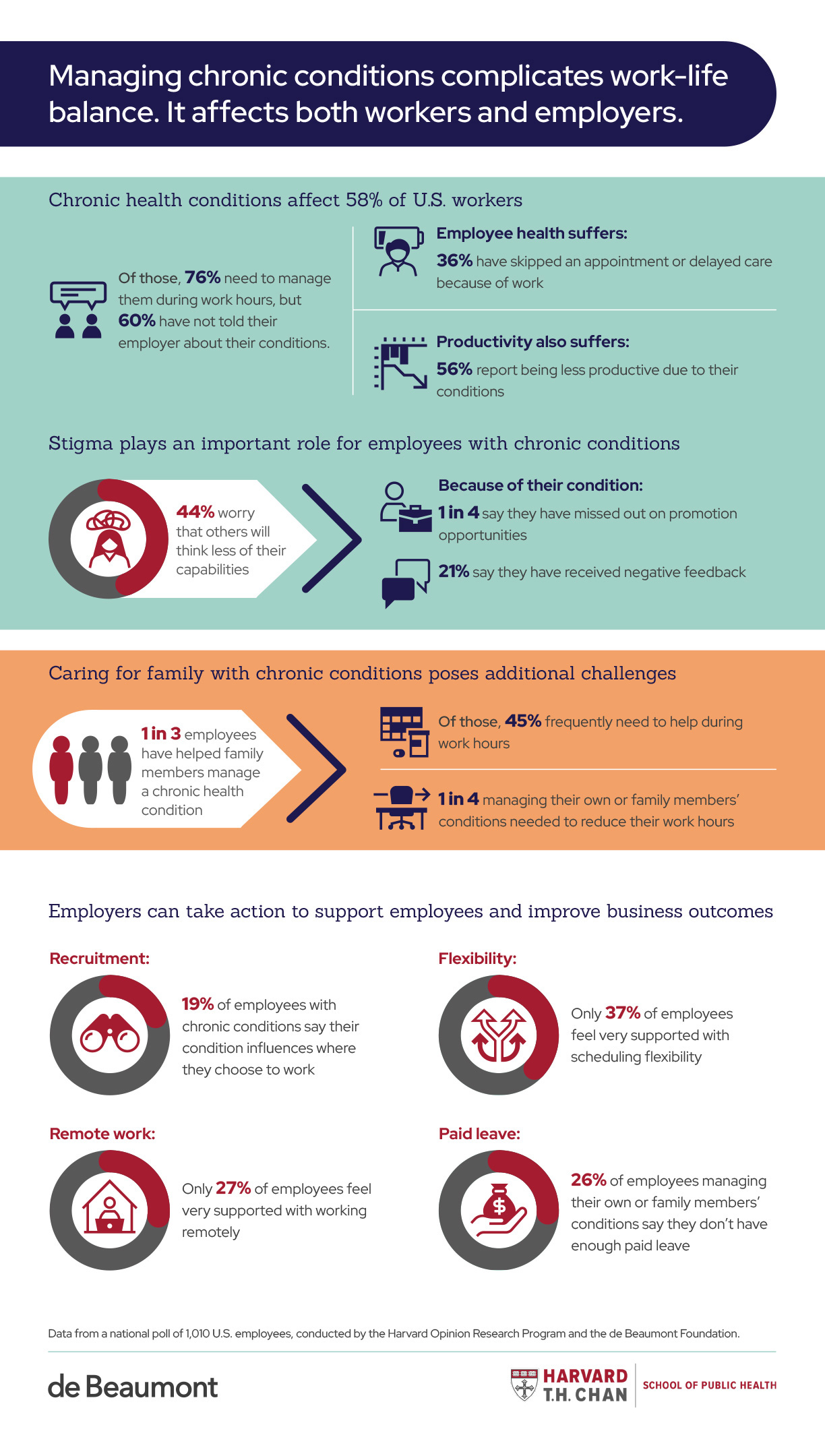Chronic health conditions are taking a major, hidden toll on the U.S. workforce’s lives and productivity, according to a new national poll by Harvard T.H. Chan School of Public Health and the de Beaumont Foundation. The poll, conducted among a national sample of U.S. employees, found that three-fourths (76%) of those with chronic conditions—such as hypertension, heart disease, diabetes, and asthma—need to manage their conditions during work hours. Yet a majority (60%) have not formally disclosed their conditions to their employer.

Data from a national poll of 1,010 U.S. employees, conducted by the Harvard Opinion Research Program and the de Beaumont Foundation.
The poll found that more than half of employees in the U.S. (58%) report having physical chronic health conditions, with many structuring their health care to account for their jobs or going without. Notably, more than one-third of employees with chronic conditions (36%) say they have skipped medical appointments or delayed getting care to avoid interfering with work in the past year. And about half of those with chronic conditions say, in the past year, they felt they could not take time off work (49%) or take a break while at work (49%), even though they needed to because of their conditions.
Missed opportunities and stigma
In addition, one-third of employees with chronic health conditions (33%) say in the past year they have missed out on opportunities for more hours or projects because of their conditions, while 25% report missing out on opportunities for promotion and 21% report receiving bad reviews or negative feedback as a result of their chronic health conditions.
“Though employers may think they know their employees’ needs, poll results suggest there are widespread and frequently hidden challenges facing workers with chronic conditions,” said survey lead Gillian SteelFisher, PhD, director of the Harvard Opinion Research Program and principal research scientist at Harvard Chan School. “Workers commonly feel stigmatized by their conditions, and this can have a profound effect on both their work and their health. To help retain employees in a tight job market, employers may want to have more conversations with employees about ways that they can make work ‘work’ for everyone.”
Challenges managing family members’ conditions
The poll also found that a significant share of the U.S. workforce faces additional challenges caring for family members with chronic conditions. One-third of all employees (33%) say they have helped family members with their chronic conditions in the past year, and nearly half of those helping family members (45%) frequently needed to do so during working hours. More than a third of those helping family members (37%) say it has been difficult to take time off work, and among those helping family members or managing chronic conditions themselves, a quarter (25%) have needed to reduce work hours to manage this.
Concerningly, one in four employees who have chronic conditions themselves or help family members with theirs say they don’t have any paid leave (12%) or have run out of paid leave in the past year (14%) because they were trying to take care of their or their family’s chronic conditions.
“There is a major opportunity for employers to play a greater role in supporting employees who are managing their own or their family’s chronic conditions,” added Brian C. Castrucci, DrPH, president and CEO of the de Beaumont Foundation. “Not only will this improve the health of employees and their families, but it will also provide employers a way to distinguish themselves, as well as improve retention and reduce absenteeism.”
Less than half of all U.S. workers say their current employer is very supportive of key measures that allow employees to manage their conditions, including allowing employees to take breaks when they feel they need it (44%) or take paid leave (44%). Fewer than four in ten say their employer is very supportive of flexible schedules or working remotely more often if the work can be done offsite (37% and 27%, respectively).
The poll, U.S. Employee Perspectives on Managing Chronic Conditions in the Workplace, was conducted October 2–16, 2024, among a probability-based, nationally representative sample of the U.S. workforce, comprised of 1,010 part-time and full-time working adults ages 18+ who are not self-employed and work at organizations with 50 or more employees.




